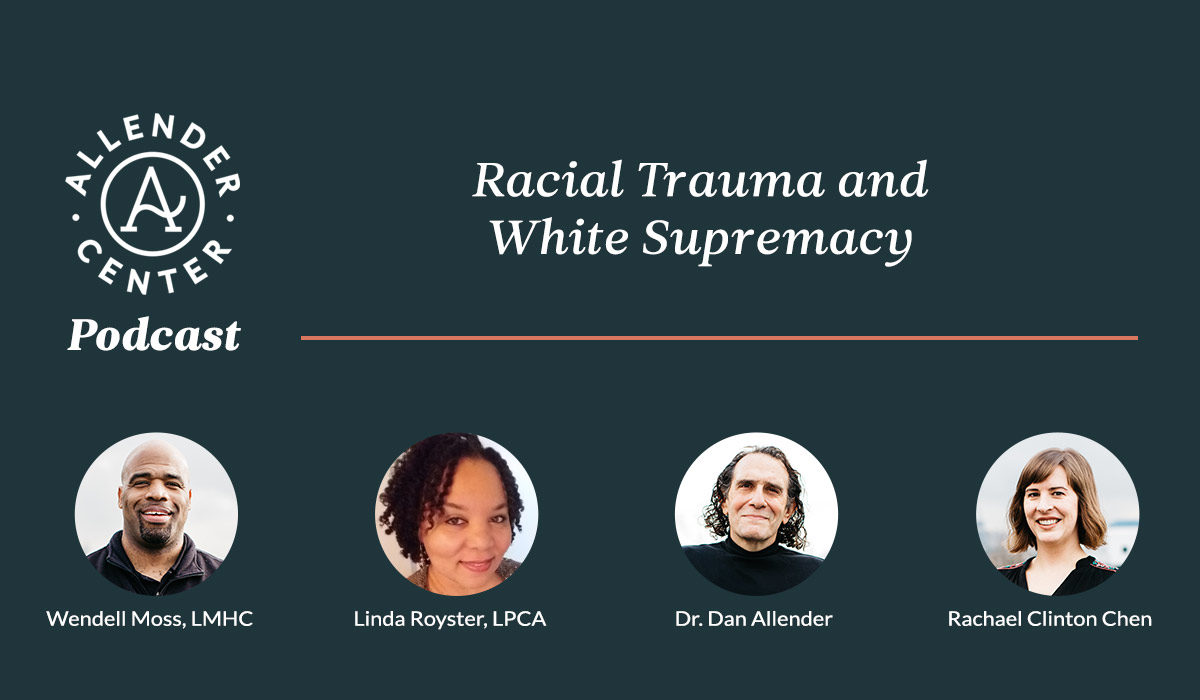Racial Trauma and White Supremacy

Today on our podcast, Dr. Dan Allender and Rachael Clinton Chen have an honest conversation with Wendell Moss, a Teaching Staff member, and Linda Royster, a Core Facilitator, about the current and generational impact of racial trauma, and the infectious nature of white supremacy within the United States, organizations and teams such as our own, and the Church. Some difficult truths are named in this episode, and we invite you, with open hearts, to be part of this journey of learning and repentance with us.
Quotes
“As we talk about whiteness, we’re talking about this thing that hovers over everyone. Love does not stop whiteness from clouding the vision. What I hope our audience is hearing and curious about, this thing that hovers even affects Rachael and Dan, even when they don’t see it. It’s not about intent, it’s something that persists.” Wendell Moss
“Whiteness and white supremacy does not love anybody. It does not love people who profess to be white because it demeans you and it certainly does not love people of color, or Black people, to be more specific. It is dehumanizing for all of us, it takes something away of who we are meant to be in community, of who we are meant to be in our own personhood—for the perpetrator and those who are suffering.” Linda Royster
“Part of White privilege is thinking you’ve created a realm where people can be who they are without actually addressing the question, ‘What’s the experience for you as an African American woman, an African American man, being in a majority world of white where the mores of how to speak, what to say, what is in one sense acceptable content’ — those were discussions that we never had.” Dr. Dan Allender
“We have to move past ‘I’m not racist’ to a question of, ‘How am I willing to do the work of being made new in the image of God as a baptized individual to all the systems and structures of the world, all the false power I’ve inherited?” Rachael Clinton Chen
“It matters who gets to tell the story. If it’s only left to one person, one group of people, it will be a biased telling—whether intentionally or unintentionally.”
“I want our audience to be aware of what you are asking of people of color when you ask them to tell you their experiences. Do you even have the capital to ask that of them? Do you have the history to ask that of them? Know what you are asking, or maybe you just have to do with a book.” Wendell Moss
“I don’t know if most white people, especially white Christians, have been invited to do the work of being part of a racial system, a collective story, not just as an individual, but as a part of how this plays out. If we are people who profess that Jesus is God, that he has made a way for us, then it is time for us to practice what we preach, the grace that has to come in order to tell the truth about our culpability in the story. To confess, to bear the agony and the sorrow, to share in the burden of the suffering, and then to begin the daily, life-long work of asking Jesus to dismantle every part of that demonic system.” Rachael Clinton Chen
“What does scripture say? What is the story, from beginning to end, of the people of God, and Jesus himself? What are those stories really saying about the context of what is going on? What I’ve come to see is the story of oppressed people from beginning to end, standing, surviving, resisting empire and oppressive structures, and it ultimately led to this man of color being crucified on a cross.” Linda Royster
“Bias is present when we read Scripture … whether we are aware or not. From my standpoint what constitutes a form of racism is where there is denial or defensiveness that the bias exists instead of being open to having our lens, the lens that we look at through our world. As a white person, I don’t know how to go and see if I’m not willing to investigate and to lay down my bias by naming that I’m not aware of my bias, but I have some clue to it, and then to begin the process of reading, thinking, engaging, and hearing.” Dr. Dan Allender
Resources
- Read The Color of Compromise: The Truth about the American Church’s Complicity in Racism by Jemar Tisby
- Read White Rage: The Unspoken Truth of Our Racial Divide by Carol Anderson
- Read Stand Your Ground: Black bodies and the Justice of God by Kelly Brown Douglas
- Read Race: A Theological Account by J. Kameron Carter
- Read works by the theologian and author James Cone
- Read works by the theologian and author Richard Twiss
